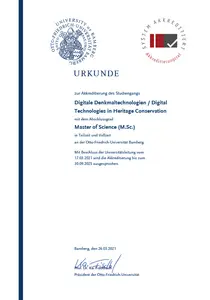Brief profile of the Masters programme
| Short profile of study programme | |
|---|---|
| Final exam: | Master's thesis |
| Title: | Master of Science (M. Sc.) |
| ECTS-Points: | 120 |
| Standard period of study: | 4 semesters |
| Start of programme: | only winter semester |
| Type of programme: | full-time or part-time |
| Admission requirement: | Bachelor's degree with grade 3.0 or better |
| Accreditation/ Certification: | Yes, the program is accredited (certified) since October 2019 by the University of Bamberg. (735.0 KB) |
Accreditation
The M.Sc. Digital Technologies in Heritage Conservation was accredited in September 2019. This means that the programme’s structure and contents fulfils the required quality criteria of the Accreditation Council. A degree in an accredited study programme can, for example, be decisive for a career in higher state service.
Summary evaluation of the accreditation company external link follows ACQUIN.
Welcome to Digital Technologies in Heritage Conservation!
We are glad that you have found your way to us, we appreciate your interest! Here you have the opportunity to learn everything you need to know about our degree programme. On the following pages you will find detailed information about the study programme, the application, current projects, excursions and much more. You can also get to know our lecturers in and learn more about living and studying in Coburg and Bamberg. With the reformed examination regulations, you can now tailor your studies even more specifically to your personal interests and goals. For architecture students, there is now even the possibility to obtain architectural order with our Master’s in Digital Technologies in Heritage Conservation.
Also take a look at our social media presence, where you can find out all about our current teaching and research activities.
We are looking forward to your application. Are there any questions left unanswered? Then please feel free to contact our student advisory service: studienberatung-msc.ddt[at]uni-bamberg.de

